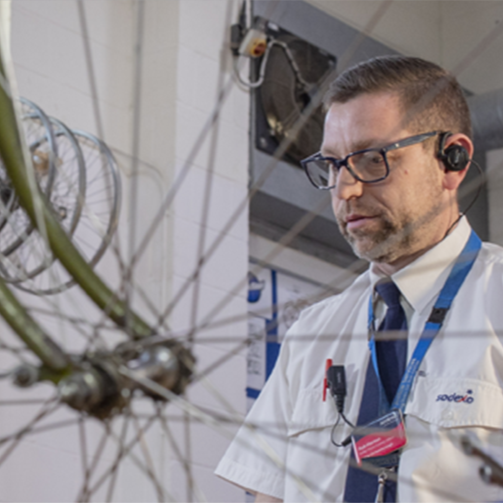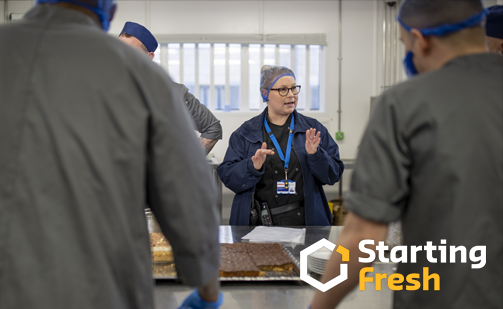
Starting Fresh: frequently asked questions
Sodexo has 30 years of experience running prisons in the UK, providing skills training within them and supporting prison-leavers and other ex-offenders in finding employment.
Frequently asked questions
These FAQs have been compiled based on conversations with thousands of prospective employers and hiring managers in the early stages of considering recruiting an ex-offender.
If the answer to your question is not here, or you would like to discuss further please do either get in touch or reach out to one of our external partners.
People with convictions often have everything employers need. That ranges from academic qualifications like English and Maths GCSEs to vocational qualifications in skills-shortage areas, including construction, hospitality and more. The majority of people also worked successfully before their offence, so they will have work experience to draw on. Within Sodexo, for example, we know that people with convictions are employed in facilities management and hospitality roles, whether front of house or behind the scenes, and can be working at an entry level or in a management role.
Employers of all sizes report that people with convictions show a real sense of commitment and loyalty. Including them in candidate selection means you have a bigger pool of talent from which to choose, and you can save money on recruitment through stronger retention. Certainly, very successful businesses – Timpsons, DHL, Iceland and of course Sodexo, to name a few – employ people with convictions on a regular basis.
Employers of all sizes report that people with convictions show a real sense of commitment and loyalty. Including them in candidate selection means you have a bigger pool of talent from which to choose, and you can save money on recruitment through stronger retention. Certainly, very successful businesses – Timpsons, DHL, Iceland and of course Sodexo, to name a few – employ people with convictions on a regular basis.
Yes. Whether someone’s attained a Level 2 Hairdressing NVQ or a Grade 9 GCSE in Maths inside a prison, they’ve reached exactly the same standard as anyone else with this qualification. Prison learning centres are OFSTED-inspected and use the same assessors as other providers. People are often surprised by how sophisticated the set-up is. If you’d like to see it for yourself, you can talk to New Futures Network or get in touch with us.
Start at New Futures Network. This government scheme can connect you with its own regional brokers as well as a network of local organisations like Clean Sheet. This route is probably less daunting then trying to start from scratch, and they’re set up to help. You can also, of course, always contact us in the first instance.
No, you can employ someone who qualifies for ‘Release on Temporary License’ (ROTL). This means they are allowed to leave the prison grounds during the day and work part-time or full-time in the community. This is a key part of the resettlement process, and many employers will offer people this job permanently when they have completed their sentence.
It depends entirely on what works for you. You could fill a full-time position with someone who’s been released on temporary license or take them on when they’re released (or both).
You can become a ‘ban the box’ employer by simply removing the check box about whether someone has convictions from your application forms, unless of course that information is essential to the role. More than 100 companies have signed up, including Sodexo, and the Ban the Box website has lots of useful information about how it works.
Prisons that have a resettlement function all have an Employment Hub and a Prison Employment Lead. In the Hub, live positions are posted onto noticeboards and prisoners can access secure online job search tools to look for vacancies.
Yes absolutely. We would welcome employers to come in and visit if they felt this would support their ability to employ even one prison-leaver. Please just contact us to arrange. If your local prison is not a Sodexo-run establishment, we can still support you in making that connection.
Yes absolutely. We would welcome employers to come in and host a recruitment day – this is something we have already done with employers. Please just contact us to discuss. If your local prison is not a Sodexo-run establishment, we can still support you in making that connection.
Not necessarily. If there is a good candidate who has a criminal record, you can conduct a risk assessment about the nature of that offence and the impact for the specific role in that location. This will help you ascertain whether the offending history does actually present a risk in relation to the job you would be asking the individual to do. There are of course certain roles that have more robust risk assessments than others, particularly those that involve working with children or vulnerable adults – these do rule out the majority of offending histories.
Lots of employers say that people with convictions are great colleagues that stay with them for longer because they’re committed to their work and keen to prove the difference they make. There’s never a guarantee of course, but we do know that retention is still an issue for companies that don’t hire ex-offenders.
People with convictions find it harder to get jobs, and it can often mean they work harder to keep them. 80 per cent of employers surveyed by the New Futures Network said the people they hired were reliable and hardworking. It’s not 100%, but then not many businesses could say that either.
Even with the best intentions, some hires just don’t work out. Here at Sodexo, we often don’t know who’s got a conviction and who hasn’t, so we just follow our usual practice for managing performance. There’s no need for a different approach.
If you think you need to, then talk to the colleague who has the conviction first, particularly if you’re a small organisation. We do know that colleagues at the salon Emily worked at knew she was going home to HMP Bronzefield by night. Plenty of people are supportive of those who are Starting Fresh. Many larger employers, like Sodexo, make a general point of saying that they employ people with convictions, so it’s not a secret to customers or colleagues.
Not necessarily, although someone who had a long prison sentence might need a bit of time to adjust. If you were to employ someone who was on probation, their probation officer would need to approve the role and would complete a risk assessment too. They’d then keep in touch with the employee to see how things are going and may ask them to attend appointments. There’s plenty of organisations working in the community that can help your new hire – and you – manage the settling-in process well.
If you contact us, we can arrange for you to speak to the Prison Employment Lead and outline your requirements. They will be able to provide you with the appropriate referrals.
If you look at men’s prisons, about 25% find work at the point they are released. Finding employers willing to offer them roles is one of the biggest barriers, yet employers that do recruit prison-leavers say they stay with them for longer than their average employee. Stable employment is also a key factor in preventing re-offending.
Yes. You may only employ one person from an offending background, but the impact is felt widely. In the UK, around 200,000 children have a parent in prison and employment is a crucial factor that helps to stabilise family life.
There are a number of risk assessments that are completed at this stage. These include looking at their current offence, their previous convictions and taking into account their behaviour in prison. We will always consider the risk of harm that a prisoner poses both to themselves and others before considering suitability for a job vacancy. We will also liaise with employers prior to any placements to discuss the process and provide the opportunity for them to ask questions.
We will firstly consider a prisoners suitability by looking at their current learning ability and outcomes. We will then appropriately match a prisoner to a workshop or skills training, and ask for a risk assessment from the offender management team. This risk assessment will examine suitability based on their offending history and current behaviours in custody. Prisoners will be sifted out of the process if it is felt they do not meet the criteria based on risk and need.

Frequently asked questions
Our frequently asked questions (FAQs) have been compiled based on conversations with thousands of prospective employers and hiring managers in the early stages of considering recruiting an ex-offender.